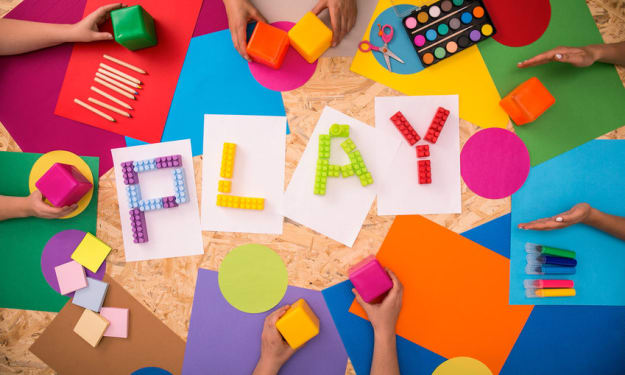A Day in the Life of an Early Childhood Teacher
Nurturing Young Minds

A Day in the Life of an Early Childhood Teacher: Nurturing Young Minds
In the bustling world of early childhood education, dedicated teachers embark on a daily journey filled with purpose, compassion, and dedication to shaping the bright futures of their young charges. With a commitment to excellence and adherence to Early Learning Standards, these educators orchestrate a symphony of learning experiences, ensuring each child thrives in a safe, healthy, and stimulating environment.
From the moment children step through the door, early childhood teachers wear multiple hats, seamlessly transitioning between caregiver, educator, and nurturer. Their days are meticulously planned, blending structured routines with spontaneity to cater to the unique needs and interests of every child.Implementing lesson plans that align with Early Learning Standards forms the backbone of the day. These standards encompass various domains of development, including social-emotional, physical, cognitive, and language, ensuring a holistic approach to learning. Teachers craft engaging activities that promote exploration, creativity, and problem-solving, fostering a love for learning from the earliest age.
Structured routines provide stability and predictability, essential for young children's sense of security. Teachers guide children through a carefully choreographed sequence of activities, including circle time, group discussions, art projects, sensory play, and outdoor exploration. Within this framework, ample opportunities for free play allow children to exercise autonomy, develop social skills, and express themselves freely.Central to the early childhood teacher's role is creating a safe and healthy learning environment. Vigilant supervision ensures children navigate their surroundings with confidence and curiosity while adhering to safety protocols. Teachers model healthy habits and provide nutritious snacks, nurturing not only the mind but also the body.
Beyond academic instruction, early childhood educators prioritize social-emotional development, laying the foundation for lifelong well-being. They foster positive relationships, teach conflict resolution skills, and celebrate diversity, creating an inclusive community where every child feels valued and respected.Quality early childhood education extends beyond the classroom walls, involving collaboration with families and the wider community. Teachers maintain open lines of communication, providing regular updates on children's progress and offering support and resources to parents. They forge partnerships with local organizations and professionals, enriching the learning experience through field trips, guest speakers, and community events.
As the day draws to a close, early childhood teachers reflect on the myriad moments of growth, laughter, and discovery shared with their students. Each smile, every milestone reached, reaffirms their passion for nurturing young minds and making a lasting impact on the future generation.In the vibrant tapestry of early childhood education, teachers stand as beacons of inspiration, dedicated to unlocking the full potential of every child. Through their unwavering commitment to excellence, they sow the seeds of curiosity, kindness, and resilience, shaping a brighter tomorrow for all.
Early childhood education isn't just a profession; it's a calling—a profound journey of love, learning, and limitless possibilities.
In the landscape of education, the role of early childhood educators often stands as the foundation upon which future learning is built. While their impact may not always be immediately apparent, the influence they wield is profound, shaping not just academic outcomes, but the very fabric of society. In this article, we delve into the significance of early childhood education as a profession, exploring its importance, challenges, and the rewarding journey it offers to those who embark upon it.
**The Importance of Early Childhood Education:**
Early childhood, typically defined as the period from birth to eight years old, is a critical phase in human development. It lays the groundwork for cognitive, social, emotional, and physical growth. Research consistently demonstrates that experiences during these formative years profoundly impact future learning, behavior, and health outcomes. Therefore, the professionals entrusted with guiding children through this period play an indispensable role in shaping their lifelong trajectories.Early childhood educators are not mere caretakers; they are facilitators of learning and development. They create nurturing environments where children feel safe to explore, inquire, and discover. Through play-based activities, structured learning experiences, and meaningful interactions, they cultivate essential skills such as problem-solving, communication, and emotional regulation. In doing so, they empower children to become curious, confident, and resilient learners.
**Challenges in the Field:**
Despite its significance, the field of early childhood education faces numerous challenges. Low wages, inadequate resources, and a lack of societal recognition are among the most pressing issues. Many early childhood educators work long hours for modest pay, often without access to professional development opportunities or essential benefits. This not only undermines their well-being but also contributes to high turnover rates within the profession.Furthermore, the complexities of addressing diverse learning needs, supporting children with disabilities, and navigating cultural differences require specialized knowledge and skills. Yet, many early childhood educators lack access to comprehensive training and ongoing support. Without proper resources and professional development, they may struggle to meet the evolving needs of their students and provide high-quality learning experiences.
**The Rewarding Journey:**
Despite these challenges, a career in early childhood education is profoundly rewarding. The opportunity to witness the joy of discovery in young minds, to nurture their growth and development, is unparalleled. Every milestone achieved, every obstacle overcome, serves as a testament to the educator's dedication and impact.Moreover, early childhood educators play a vital role in fostering a more equitable and inclusive society. By providing children from diverse backgrounds with access to high-quality education and support, they contribute to breaking the cycle of intergenerational poverty and inequality. They are champions of social justice, advocating for the rights and well-being of the most vulnerable members of society.
In conclusion, early childhood education is not just a profession; it is a calling—a commitment to shaping the future one child at a time. Despite its challenges, the impact it has on individuals, families, and communities is immeasurable. As we recognize the importance of early childhood educators and invest in their professional development and well-being, we pave the way for a brighter, more equitable future for generations to come.
About the Creator
Samantha Dominguez
Ms.Sam 🍎
Mommy of 2 👩👧Homeschool Mama
Early Childhood Education 🧮
Early Childhood Academic Advisor 📚
Pre-K CLASS Observer 🖍
B.S. ECE Educational Studies. 👩🏫
M.S.Ed ECE coming soon 💥
CCEI Formal Observer & PDS
🌵Texas ➡️ 🌴Florida






Comments
There are no comments for this story
Be the first to respond and start the conversation.